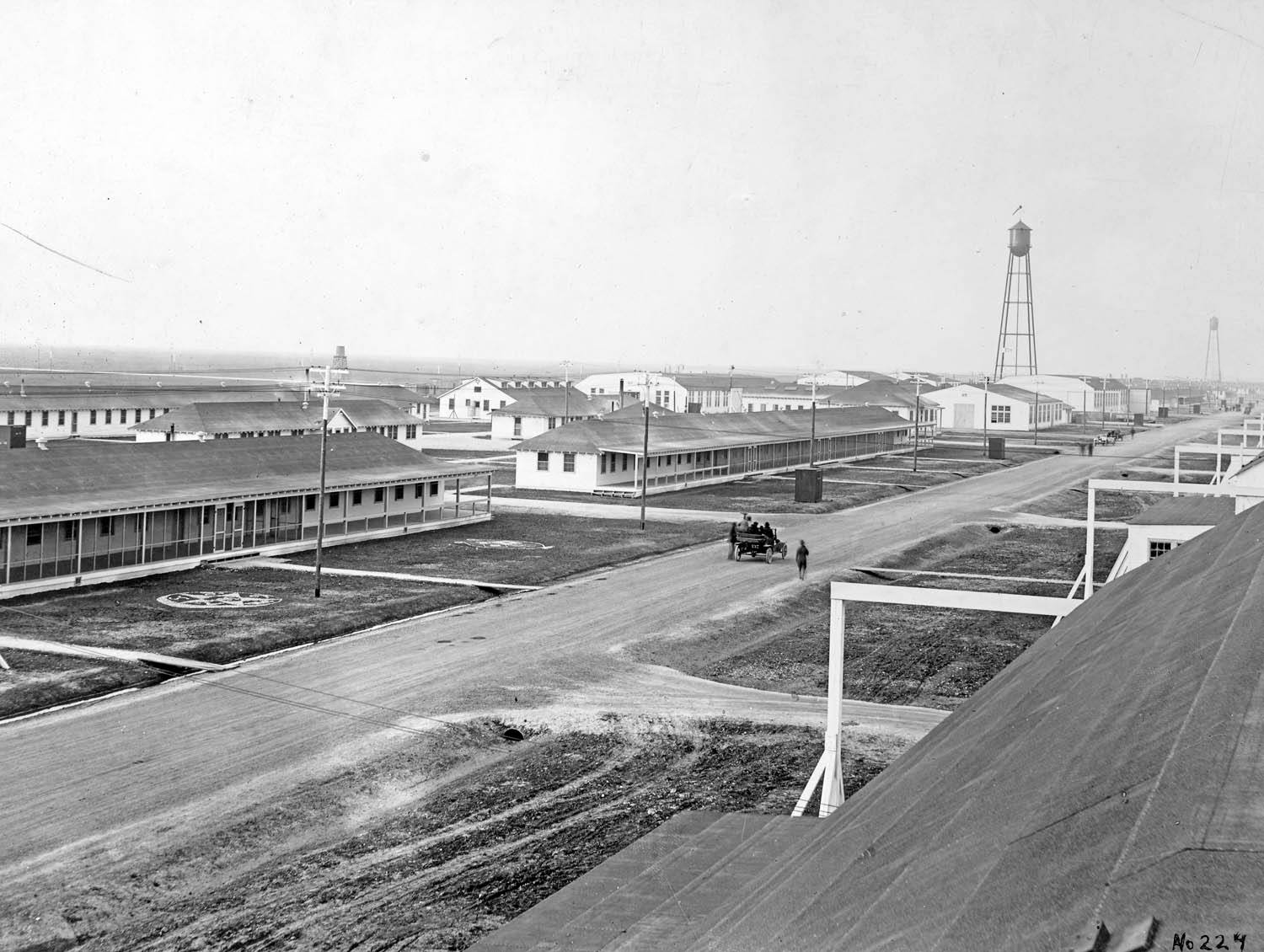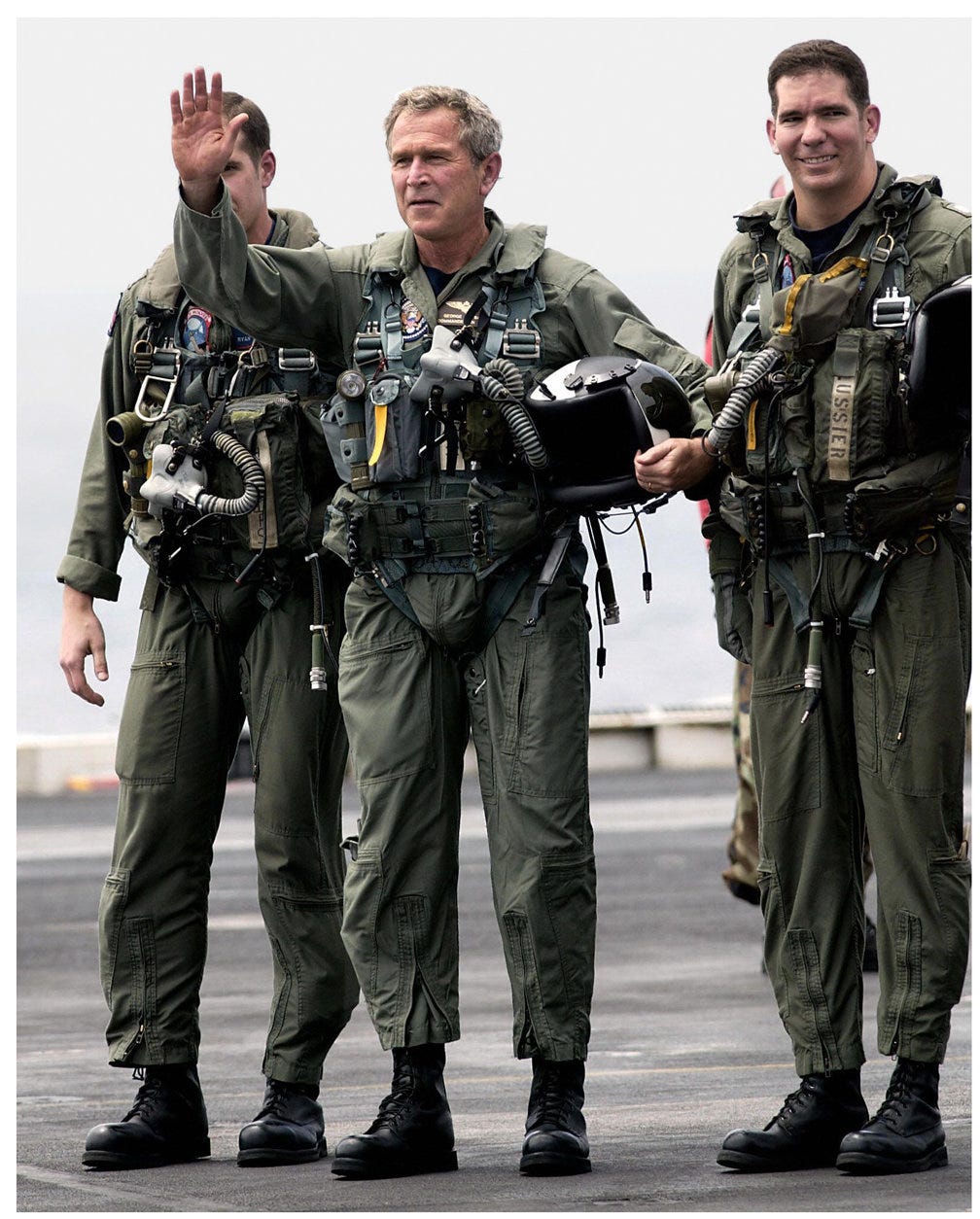A Culture of Cowardice
I thought about a conversation I had with him on an airplane once because of the recent speculation that George W. Bush might endorse Kamala Harris. Sure, there is a non-zero chance of that happening, but I suggest you place your bets elsewhere.

We were somewhere over America at 35,000 feet and moving along at well over 500 nautical miles per hour. I do not remember the location but I do recall the conversation. The flight was out of a western U.S. city and was eastbound with the Republican candidate for president and a fuselage full of reporters and campaign staffers. The dull thrum of the jet engines at altitude and the long day of tramping around chasing after interviews and video and still photos had left most of the passengers tired and dozing.
George W. Bush, though, had not been too stressed. Hands were shaken, a few comments were tossed off to placate the media, and he walked around trying his best to look natural and enthused. The rest of us had to create a journalistic product and meet deadlines, and we were expended. The future president, however, came sauntering down the aisle of the plane with a non-alcoholic beer in his hand, looking for someone still awake. I must have been the only one conscious because he took the aisle seat in the empty row where I was sitting, and began to make small talk.
“What’d you think of today?” he asked. “Pretty good crowd, no?”
“Good turnout wherever we’ve been, Governor.”
“Yeah, yeah. I’m trying to get a sense of how this thing is going.”
“Those fund raising numbers you announced in L.A. the other day ought to tell you.”
“True. True. Those are a positive indication.”
I was unaccustomed to small talk with Bush as governor or presidential candidate. He often came back in the plane at the end of the day when reporters were working on deadline and distracted us when he had no further responsibilities. We were hardly strangers since I had reported on his time as governor of Texas and his career in the oil patch and with the Texas Rangers baseball team. I had also been filing Freedom of Information requests regarding his time in the Texas National Guard and had set off alarms in his campaign during a gubernatorial debate with Ann Richards when I asked him about his service. I thought our relationship was always going to be arm’s length but he seemed open to a conversation on this night and I did not hesitate.
“I gotta tell ya, Governor,” I said. “You sometimes don’t look too enthused about winning this election.”
“Oh come on. What do you mean?” He was genuinely surprised by my assessment.
“I know you aren’t just going through the motions but I honestly think something is missing from your pitch. I’m not qualified to say these things, I know, but I often find myself wondering why you are running. Being governor of Texas is a pretty great political job, no?”
“Oh, yeah. I love it. I do. More than most folks realize. But I had to do this.”
“What do you mean, ‘You had to?’”
“It was expected, that’s all.”
“By whom? I don’t follow.”
“It’s just my time. My family, the business community, the party, everybody expects me to run for president, and that’s what I’m doing.”
“And you don’t want to?”
He did not answer and looked away from me. I let the question sit for a moment and then asked what he would do if he lost.
“Oh, that wouldn’t be such a bad thing. Laura and I would go back to Dallas. I’d sit on some boards. Might make a run at baseball commissioner. Laura and the girls and I would have a nice life.”
The man who was about to win one of the most important jobs on the planet was apparently ambivalent about his role and significance to the free world. I was unsurprised. Hard work was not part of what had formed his character. Privilege had handed him a set of tools to work with and he had let most of them lay on the floor. His oil company in West Texas had managed to drill most of the dry holes in the Permian Basin when other production companies were finding crude almost as easily as hammering pipes into the ground and waiting for gushers. His performance in the energy industry did not promise a great future in the White House.

I thought about our airplane conversation again because of the recent speculation that Bush might endorse Kamala Harris. Sure, there is a non-zero chance of that happening, but I suggest you place your bets elsewhere. Bush does not, and has not, stuck his neck out when there is a chance he will regret the risk. He likes the victory dance, not the battle. His grandest performance has always been acting the tough guy as he sends others into distant fields of fire. When he stood on the rubble of the Twin Towers after 9/11 and talked about finding the people who committed the attack, he was a little man acting big, and making poor choices.
In about 18 months, the president who had used family connections to avoid combat in Vietnam, had gotten Congress to approve $63 billion dollars to invade Iraq regardless of the fact that Saddam Hussein’s government was not involved in the terrorist acts in New York City. Only a small portion of the allocation was meant for the war in Afghanistan even though the attacks of 9/11 were led by Osama bin Laden, who was hiding out in the mountainous country, and our intelligence agencies had advised the White House of his whereabouts. Instead, Bush was compelled to revenge his father’s failures in Iraq and to take down Hussein, which was really just a bonus since the primary goal of the U.S. invasion was to secure the oil supplies.
“Iraq,” Assistant Secretary of Defense Paul Wolfowitz had said, “Simply floats on a sea of oil.”
While he was busy spending tax dollars to build up his profile as a “war president,” Bush was also cutting taxes with his Jobs and Growth Tax Relief Reconciliation Act, (JGTRRA) which reduced the dividend tax rate from 38.6 percent to 15 and cut the capital gains tax to the same level. Harvard Business School must have taught him a new nonsense that increasing spending while reducing taxes was smart economics, or maybe that was one of the classes he had skipped. The JGTRRA act also dramatically increased the amount of money that could be written off as expenses for investing in businesses.
As the cost of invasions of Iraq and Afghanistan increased exponentially to almost $2 trillion dollars, deficits soared to heights known only by the war president’s ego. The groundwork had been laid for the Great Recession and war spending meant the federal government had little flexibility to respond when the financial crisis arrived. By 2008, when Bush was leaving office, the U.S. national debt had increased from about $5.8 trillion in 2001 to nearly $10 trillion, but, hey, W. looked good in his “Mission Accomplished” flight suit on the deck of the aircraft carrier. The mission was not, as history records, accomplished, and the Mideast remains restive. The main achievement was a waste of resources.
Bush has been without character and principle his entire adulthood. When he finished business school at Harvard and became eligible for the draft in the Vietnam War, he turned to his father’s friend, Texas Lt. Gov. Ben Barnes, to get him a cushy pilot’s commission in the Texas National Guard. Barnes placed Bush on what was known as the “political list,” which was sons of well-connected and wealthy Texans determined to keep their progeny out of the meaningless war. The documents I and a few other reporters received, from military records showed that he had skipped out on a physical exam to keep flying and that he had been grounded for reasons unknown. Any pilot grounding required a Board of Inquiry hearing and report, but Bush’s was missing from his file.
Bush left Ellington Airfield outside Houston for Montgomery, Alabama, to work on a U.S. Senate campaign for a friend of his father’s. Although there were dozens of pilots home from Southeast Asia wanting to keep their certificates up to date with “stick time,” Bush was still given a commission that cost taxpayers a million dollars in a failed attempt to make him competent in fighter jets. The only result was to keep him out of the jungles of Vietnam. As president, however, he got to play brave fighter pilot when he donned a flight suit and joined an actual pilot who landed a jet on the deck of an aircraft carrier. More vacuous performative crap to make him feel the courage he does not possess.
There has been too much historic revisionism around the Bush presidency. Trump’s incompetence and lack of intellect have shifted the paradigm a bit for presidential performance. Bush, his apologists argue, would be great to have around in Trump’s stead; not much of a recommendation since even the waste control manager of Rio Grande City offers more accomplishment than Trump. Bush, unnecessarily set the Mideast to flame, and it is still burning. The Lancet Report estimates that 650,000 Iraqis, soldiers, and civilians died during the U.S. invasion and occupation while around 4500 American soldiers and 3500 civilian contractors all lost their lives. Meanwhile, in the Basra region of Southern Iraq, dust from depleted uranium used in weapons by the U.S. has caused a dramatic increase in congenital birth defects and various forms of cancer among Iraqis. The war president will keep counting casualties for generations.
Bush is a man without conscience, though, who sleeps well at night thinking about the facile paintings he has left on canvas. No thought for Iraqi dead or American soldiers lost in a conflict that only led to continued destabilization of the Mideast. The blood and treasure he wasted on Iraq was not his. The Bush’s were safe, protected from loss of life or capital. No risk existed for him to authorize weapons and facilitate lies about WMD in Iraq when intelligence said there were none and everyone in his administration was involved in cooking the data to make the case for war. I am not sure why a person like Kamala Harris would want, or even accept, an endorsement from a war criminal like George W. Bush. There's nothing she should worry about, though.
Cowards do not endorse.